Philadelphia Failure to Giant Success: Inside Gabe Kapler’s Transformation

Fourteen hours after the Giants’ 2021 season ended, manager Gabe Kapler began working on 2022. San Francisco won a franchise-record 107 regular-season games, then lost the National League Division Series to the rival Dodgers in a winner-take-all Game 5 that ended 2–1 on a missed checked-swing call. It was a heartbreaker that did not break Kapler’s heart.
“From a strategic standpoint, we really couldn’t have planned it better,” he says. “The game worked out in a way that was quite favorable for us.”
Ace Logan Webb, pitching in his first postseason, baffled the league’s most fearsome lineup for seven innings. Kapler handed the ball to his two most dominant relievers, Tyler Rogers and Camilo Doval. The team used its bench aggressively, seeking advantageous matchups for each hitter. The defense was perfect. The offensive approach was sound. The pitch selection was good. It just didn’t work.
So Kapler, 46, did not cry. He did not wonder what he could have done differently. He did not allow his frustration to linger past the moment he left the dugout.
“I think I’m wired to be a little pragmatic in that way,” he says.
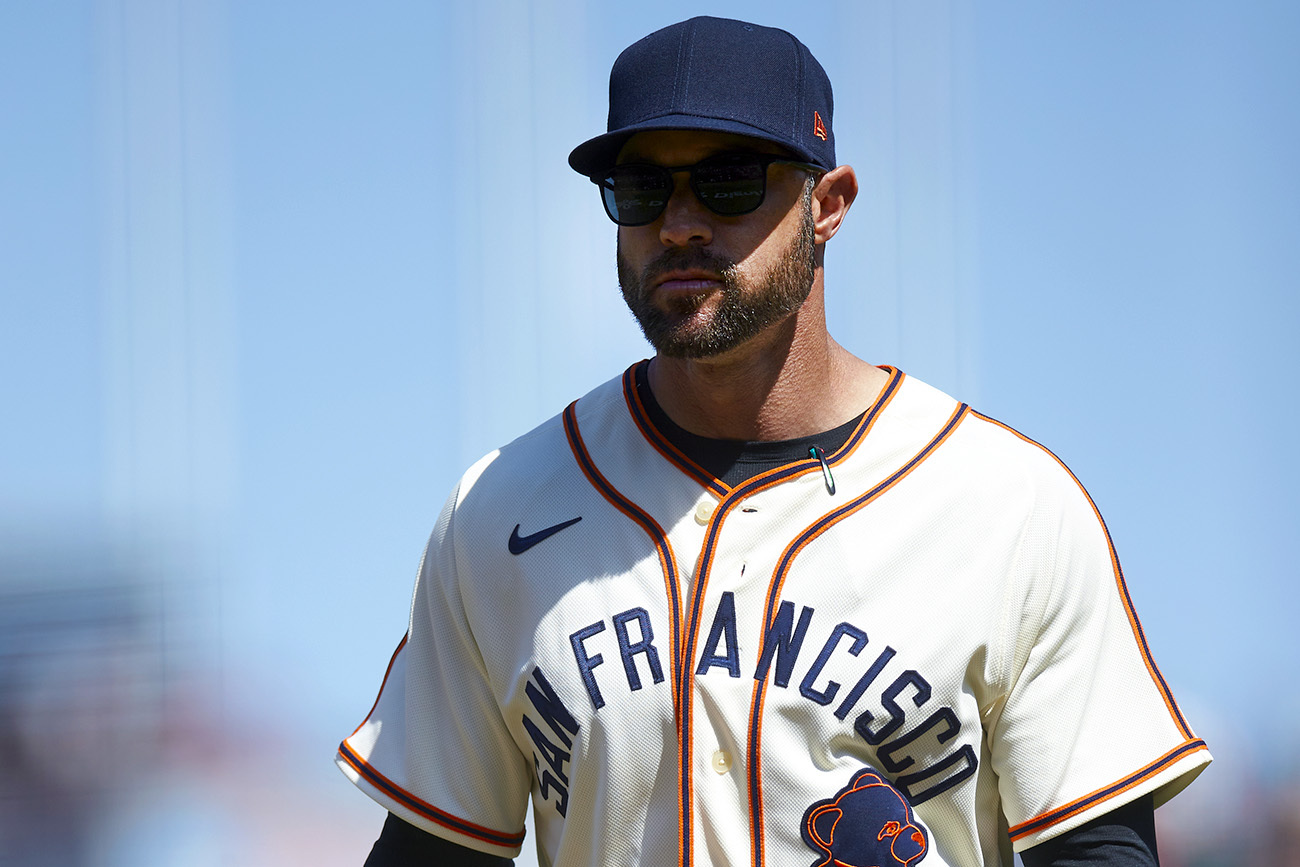
By 11 a.m. the next day, Kapler was strolling into his office at Oracle Park, past the self-serve scotch bar and the coffee table adorned with the published version of Kurt Cobain’s journal. He parked himself behind his standing desk, glowing under twin Edison-style lamps. (Kapler abhors fluorescent lighting.) He turned on his playlist, which ranges from Bon Iver to N.W.A. “It’s part speakeasy, part lounge,” says Abe Silvestri, the director of team travel and clubhouse operations. “It’s very inviting. … You almost feel compelled to walk in.”
Kapler wanted to be present as players trickled in to pack their lockers. He wanted to be available if anyone wanted to talk.
In his two years as Phillies manager, Kapler gained a reputation as someone who ran a simulation before the game and adhered strictly to whatever it spat out; in his first game, Opening Day 2018, he removed the team’s ace, Aaron Nola, after 5⅓ innings with one run and 68 pitches because the data told him to. (The reliever gave up a home run; Philadelphia lost; Kapler said he did not regret his decision.) Kapler went 160–162 and was fired in October '19. Thirty-four days later, he was introduced as Giants manager.
From afar, it seemed there was a different skipper at the helm for Game 5 of the NLDS. Webb allowed consecutive hits in the sixth inning as the lineup turned over for the third time—typically the modern manager’s cue to yank his starter—but Kapler considered everything from the shape of the kid’s slider to the look on his face. He left Webb in the game. Webb retired the next four hitters and left to a standing ovation.
There is a lesson in that anecdote, Kapler believes, but it’s not the one he fears people will take from it.
He laments what he believes is a caricature that has developed: that of the muscle-bound hippie who allows himself to lick ice cream, then forces himself to spit it out. (That only happened once, he insists.) He also dislikes the narrative that he was a different person two years ago than he is now: all analytics in Philadelphia, all gut in San Francisco. A failure with the Phillies, the frontrunner for NL Manager of the Year with the Giants. He has not changed that much, he insists. He did not leave Webb in the game because he has thrown away the data. He left him in because he is using different data than he used to.
“I really feel like there have been many, many subtle adjustments along the way, and there will continue to be many subtle adjustments based on things that go well and things that don't go so well,” he says. “I’m just a person that is trying his best along the way.”
The Giants surprised a lot of people this year. Kapler did, too.
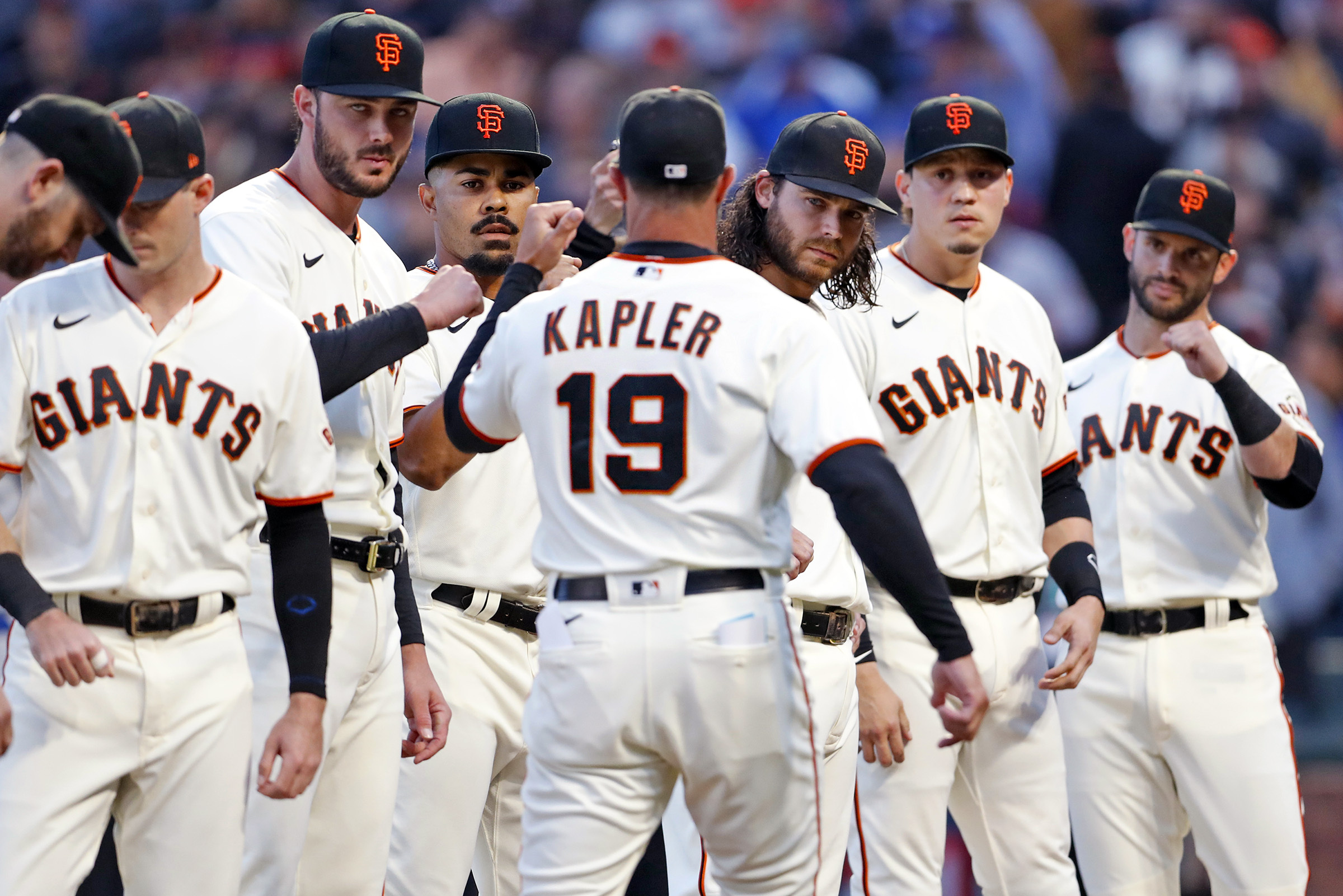
A few days earlier, he had made a decision that would have been even more unthinkable two years ago: Up seven in the ninth inning of Game 162, he declined to use a defensive replacement because he wanted the starter to be on the field to celebrate the division title. And then he did something else. When Kapler first tells the story, he uses the starter’s name. On second thought, he asks to have it removed.
“How does the player feel if he reads that?” he says.
This consideration is not new for him. But it also does not come naturally. In his 12 years as a major league outfielder, most notably with the Red Sox and the Rays, he weathered countless slights. In 1999, he made the Tigers out of spring training. But in April, the team demoted him to Triple A. He knew he was better than some of the guys who got to stay. He also knew he had minor league options and was the obvious candidate from a roster-management standpoint.
“As a player, I just didn’t take things personally in that way,” he says.
He says he never really has. His mother, Judy, the early childhood director of a Jewish preschool, and his father, Michael, a classical pianist who loved poetry, did not believe in small talk. Dinner conversation was mostly debate. Young Gabe learned that directness was a virtue—and that language was important. They reinforced this with regular games of Scrabble. Michael, who died last December from Parkinson’s and Lewy body dementia, often sent his son poetry. Kapler started a blog, KapLifeStyle, in 2013.
It has all created a manager who occasionally sounds out of place on a baseball field, such as when he says he determines how a pitcher is feeling based on his “countenance.” Kapler bristles at the idea that his speech is contrived.
“Countenance—it’s not a corporate word!” he says. “It would be very inauthentic for me to talk to people and all of a sudden, like, get into that baseball mode. I could do it—dirt in your spikes or the bat really whistled through the zone or whatever, and I bring that stuff out from time to time. But that would be really an inauthentic version.”
He runs into this problem often. He likes to read. He likes to do yoga in the outfield before games. He likes to study: scientific research, other people, the depths of his own mind. In a four-day span before spring training 2020, he visited London, Paris and Lisbon. He wanted to see everything. He ended up mostly seeing the inside of airplanes.
He prefers texting to speaking on the phone. He feels he expresses himself better in writing, and he also thinks it’s just a better experience for his interlocutor. Kapler tends to react to something he finds interesting by pausing to consider it. Sometimes these breaks can last nearly a minute. “I’ve definitely had people who are like, ‘What is going on? Why are you not talking?’ ” he says.
These would all be fun quirks in a person sitting next to you at a dinner party. They can seem foreign in a ballplayer.
But at least as a ballplayer, he was one of 25—and often the 19th or 20th man on the roster. Johnny Damon and Manny Ramírez ate whatever they wanted while Kapler peeled the skin off his chicken. As the Dodgers’ director of player development, and then as a manager, he is one of one. And he’s the one making the rules.
L.A. prospects, upon their promotion, declared that their favorite part of the big leagues was the snacks: In the minors, Kapler had replaced peanut butter with almond butter. And some people around him with the Phillies, especially early in his tenure, griped that it seemed like a laptop was filling out the lineup card. They joked about what felt like endless meetings and postgame readings of Gandhi quotes.
Kapler says he does not remember quoting Gandhi, and adds, “I don’t feel like we had very many meetings in Philadelphia. I don’t think that’s a fair representation.”
Still, he acknowledges that he did not always fit there. The organization is among the most old-fashioned in baseball. Not until 2016, when former general manager Matt Klentak took over, did it begin to build its first analytics department. In ‘17, Klentak hired Kapler away from the Dodgers and highlighted his “progressive thinking” in the announcement.
But the city never seemed to buy that as an asset. From that first Opening Day, when Kapler pulled his ace early, he was on borrowed time. Phillies fans demand excellence, and they demand it on their own terms. It seems every year contains a stretch in which the manager there faces a cluster of reporters asking if he has considered yelling at the players.
“Had I had a couple more years there, I feel like we could have done some really good things,” Kapler says. “I think we made a ton of progress, and had some colossal failures, too. Right? Any time you're going to be trying new things—and this was very true in player development with the Dodgers, too—any time you are trying new things and do it with a trial-and-error mindset, you understand that you're gonna have moments that just go wrong. People get rubbed wrong. All of those things come with growth, and there was certainly a lot of discomfort, but it got more and more comfortable as time passed. And then it was over.”
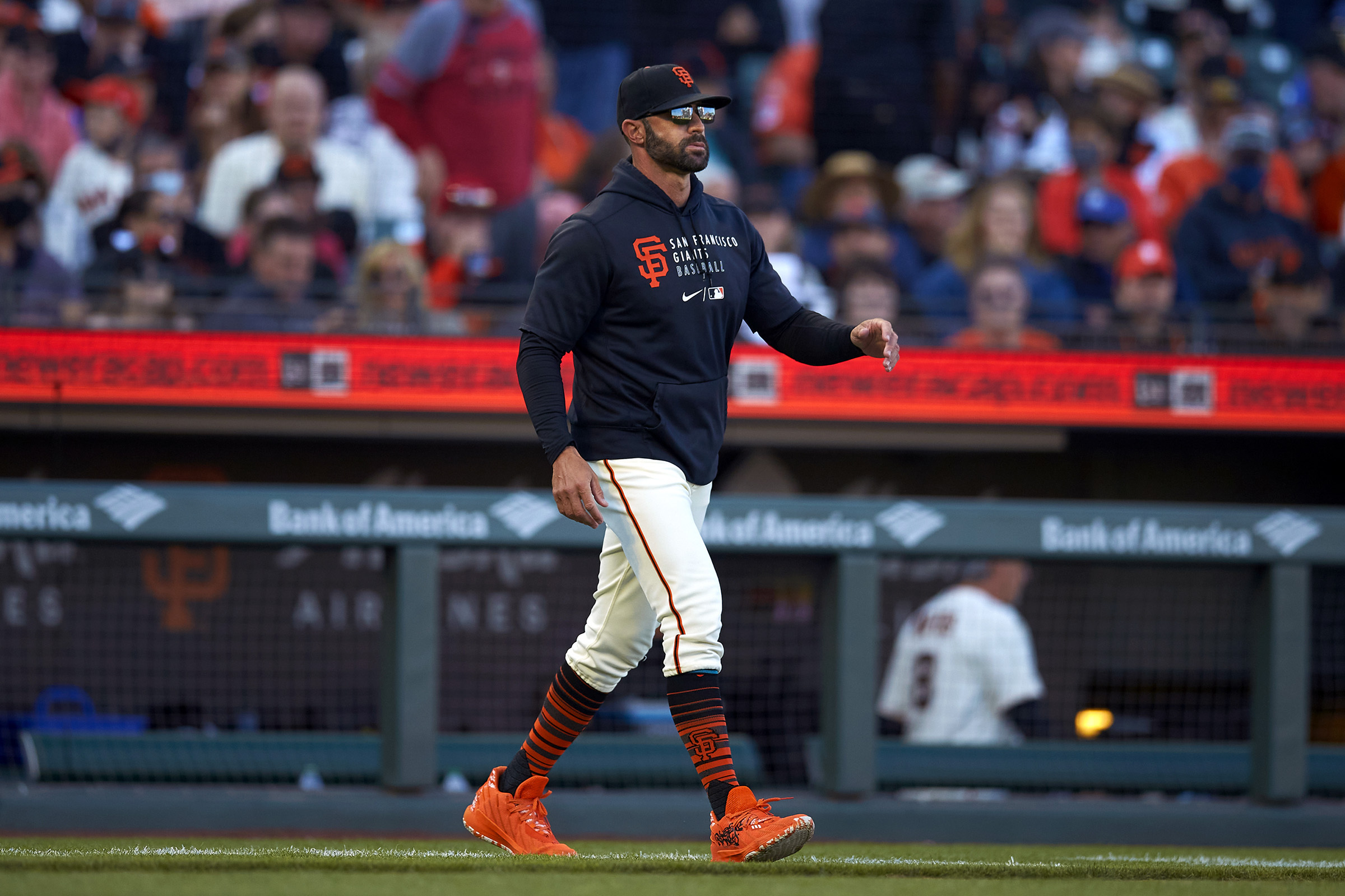
Kapler had barely sat down for his first interview with the Giants when president of baseball operations Farhan Zaidi made eye contact. “Why did you get fired?” he asked.
It was a hell of a first question. But Kapler was prepared. His unemployment was less than a month old, but he had given it a lot of thought.
“He talked about the fact he didn't meet expectations,” Zaidi says. “Ultimately, as a manager, he was responsible for the team's performance. And he got a little bit more into detail on some of the ways he kind of adjusted strategically over his time there. But he maybe felt like some of the early moves that he made, he was never able to kind of get past from a public standpoint. And I think he also kind of touched on what he learned about being flexible in how we communicate with players, that every player is different.”
Zaidi liked that answer. He had expected to: The two had worked together with the Dodgers under president of baseball operations Andrew Friedman, and Kapler had been a finalist for the L.A. manager’s job that ultimately went to Dave Roberts in November 2015. So after longtime Giants skipper Bruce Bochy announced that '19 would be his last year in San Francisco, Zaidi began casting about for candidates. He watched as Philadelphia soured on, then sacked Kapler. He reached out to express his support, planning to give his friend a respectful amount of time before he asked whether he might want to interview in San Francisco. Kapler beat him to it. Within a few days of his firing, he asked Zaidi to consider him.
Zaidi reached out to third baseman Evan Longoria, who had played for Tampa Bay with Kapler. Longoria was effusive: “I was pretty upfront about thinking that he would be a good fit for our group,” Longoria says. “Just knowing that we had a veteran group, and that he would be very respectful of that.”
Kapler was not an easy sell to management. There were a lot of other candidates available who were not still packing their home after publicly failing at their most recent job. Kapler also had to answer questions about an incident from his days with Los Angeles, when a teenage girl emailed him in 2015 to tell him that one of his minor leaguers had watched and filmed as two women punched and kicked her. Kapler consulted with other members of the Dodgers’ organization, including the legal department, and offered to mediate between the girl and the player. They did not alert law enforcement or MLB. When her child services caseworker contacted the police, the girl said a player had sexually assaulted her. Kapler and the Dodgers have said they were unaware of the allegation of sexual assault and that they would have alerted authorities had they known. No charges were ever filed.
Zaidi was the team’s general manager, and second-in-command in baseball operations, at the time, so he had intimate knowledge of what transpired. “We didn't always have the best judgment and we didn't always do the right thing, and there should have been a lot of ways to get informed and involve more people,” he says now. “But the one thing I could speak to unequivocally was the intent.”
One by one, Kapler won over the members of Giants leadership. They appreciated his candor and noted his preparation: He arrived at his interview with a list of coaches he’d like to hire. And they grew to believe he had suffered from poor timing in Philadelphia.
“I had a lot of people from that organization reach out,” says Zaidi. “People in the front office, players—prominent players on that team, who I hadn’t known, whose numbers I didn't have in my phone—said, ‘We would endorse him. He did a great job here and it's unfortunate that we had to move on from him.’ That was really meaningful.”
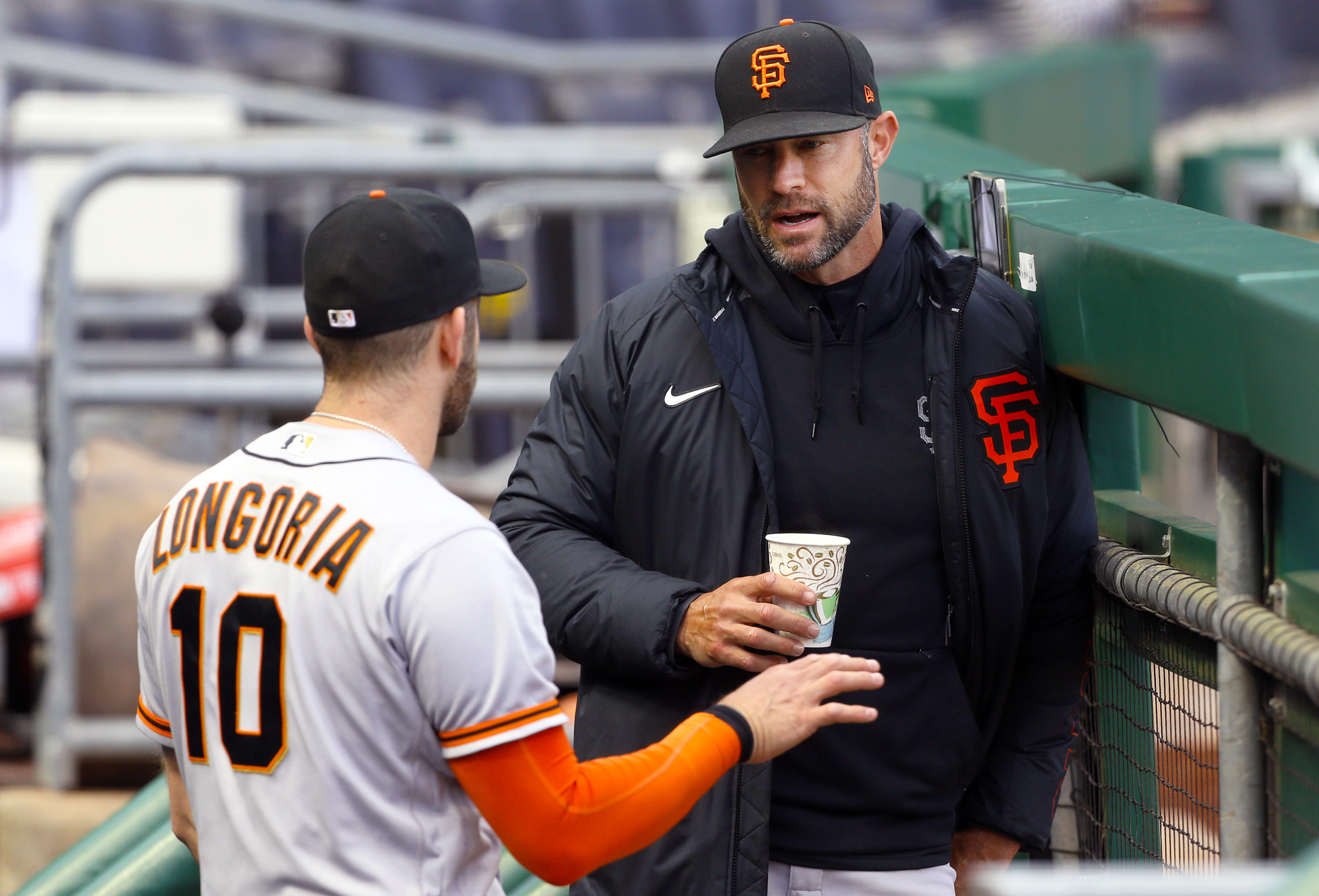
They also saw his failure in Philadelphia as a benefit. Tigers skipper A.J. Hinch started his managerial career by going 89–123 with the Diamondbacks; today he is one of the most talented leaders in the sport.
“I think being a major league manager, when you're actually in it, is very different from how guys perceive it might be,” says Zaidi. “It is really a learn-by-doing job.”
Still, Kapler had to persuade a more challenging contingent: players. They had not worked closely with him for three years, as Zaidi had. Many of them knew only of that muscle-bound hippie. Then he arrived and brought with him that staff—an enormous roster of 13 people, who averaged 37 years of age and of whom only one, third base coach Ron Wotus, had more than five years of big-league coaching experience. Seven of them had never worn a major league uniform before. And one of them, assistant coach Alyssa Nakken, is the first woman to hold her position.
Then Kapler announced that no one was guaranteed a job, even All-Star stalwarts such as first baseman Brandon Belt and shortstop Brandon Crawford. He suggested that both might be platoon players. The veterans nursed their wounded pride.
“There were some things I didn’t necessarily agree with,” says Crawford.
“I just told him I was gonna change his mind,” says Belt.
Then the pandemic hit. All-Star catcher Buster Posey announced that he would sit out a year to be with his family, including the newborn twins he and his wife, Kristen, had just adopted. The players and coaches scattered (although Kapler kept the staff in touch by scheduling weekly meetings to discuss The Culture Code).
But the players had seen something in the coaches. They noticed how hard everyone worked, how open they were to new ideas. They began to rave about the collaborative nature of the instruction. (Kapler can barely let a sentence go by without highlighting a member of his staff.) The manager let the veterans run the clubhouse. What time should the bus leave? How often should the team take ground balls? He answers nearly every logistical question with, “What do the players want?”
Silvestri says that Kapler calls to mind George Martin, the Beatles’ producer, who “let those four do their thing and didn't judge them and knew that they needed to be weird in order to create something unlike anything that's ever been created. ... You knew the Beatles were in good hands, because George Martin was overseeing the operation but wouldn't get in their way.” Kapler occupies a similar role in San Francisco, ducking into his office to work while the team engaged in increasingly ridiculous post-win celebrations. “Imagine all the things he got done while we were in there shooting toilet paper at people,” Silvestri says. “He's like, ‘There goes the toilet paper gun. Let's get back to this conversation about solving our bunt problem.’ ”
Even when the shortened season opened and the team went 8–16 to start, the team continued to buy in. The Giants finished 21–15 and missed the expanded playoffs by a tiebreaker. But the players could see where they were going.
“I think he's done a great job this year just relying on his instincts a lot and using that to help us win ball games,” says Belt. “I think that's what this organization does so well is that you're able to use numbers and data and instincts to help us win ball games, and I saw that more this year than I did last year. He's done a great job.”
Even those initial rocky conversations about playing time seemed to produce positive results.
“I think it really helped fuel guys early on,” says Longoria. “Like, we want to play every day and we still feel like we can contribute.”
And as the Giants have seen Kapler’s unorthodox methods produce success, they have become even more steadfast in their support of him. When Kapler was with the Phillies, he hired umpires to call bullpen sessions in spring training. A few San Francisco staffers heard about it and rolled their eyes: another gimmick. But Kapler brought the practice to Scottsdale, Ariz., and they soon realized this was just another way he demanded intensity.
“If they were like, ‘Hey, tomorrow, we're gonna have an umpire sitting on another umpire's shoulders behind the catcher,’” Silvestri says, “I'd be like, ‘O.K., do they need a flight?’”
In August, facing A’s lefty A.J. Puk with a one-run deficit and a man on first, Kapler pulled back slugging lefty LaMonte Wade Jr. and pinch-hit righty Donovan Solano, who had five long balls all year.
Says pitcher Kevin Gausman, “Everybody in the dugout is like, ‘All riiight,’”—he grimaces—“then, first pitch, two-run home run. We’re like, ‘All right!’ ”
Kapler feels comfortable removing a starting pitcher after five outs and using all his position players, both of which he did during Game 4 of the NLDS. Wotus worries that they will run out of players. That would be an embarrassing outcome. Kapler, though, does not blush as easily as other people. He mostly believes shame is a product of misunderstanding.
“I would feel less embarrassed if people would get to know me a little bit better and give me a chance,” he says.
But surely if he fell on the street he would feel embarrassed, not misunderstood?
“If you fell on the street, and nobody was around, would you feel embarrassed?” he says. “It’s the perception that creates the embarrassment. … Some of the things that have been embarrassing for me, the perception is not always accurate.”
And what about when it is?
“Let's just go on the assumption that getting fired in a very high-profile way … let’s assume that’s embarrassing and let’s assume it’s warranted,” he says. “I will assume that. If a team expects a certain level of performance and you don't meet that level of performance, that’s what happens in baseball. Even with all of that, I knew that I was gonna be in baseball for a really long time. I still have a lot of people that I was connecting with, working on things with regularly, I have businesses outside of baseball that I'm working on, nonprofits outside of baseball. And there's a lot to get to.” When the Phillies canned him, he did not sulk in his Philadelphia apartment. He began researching San Francisco.
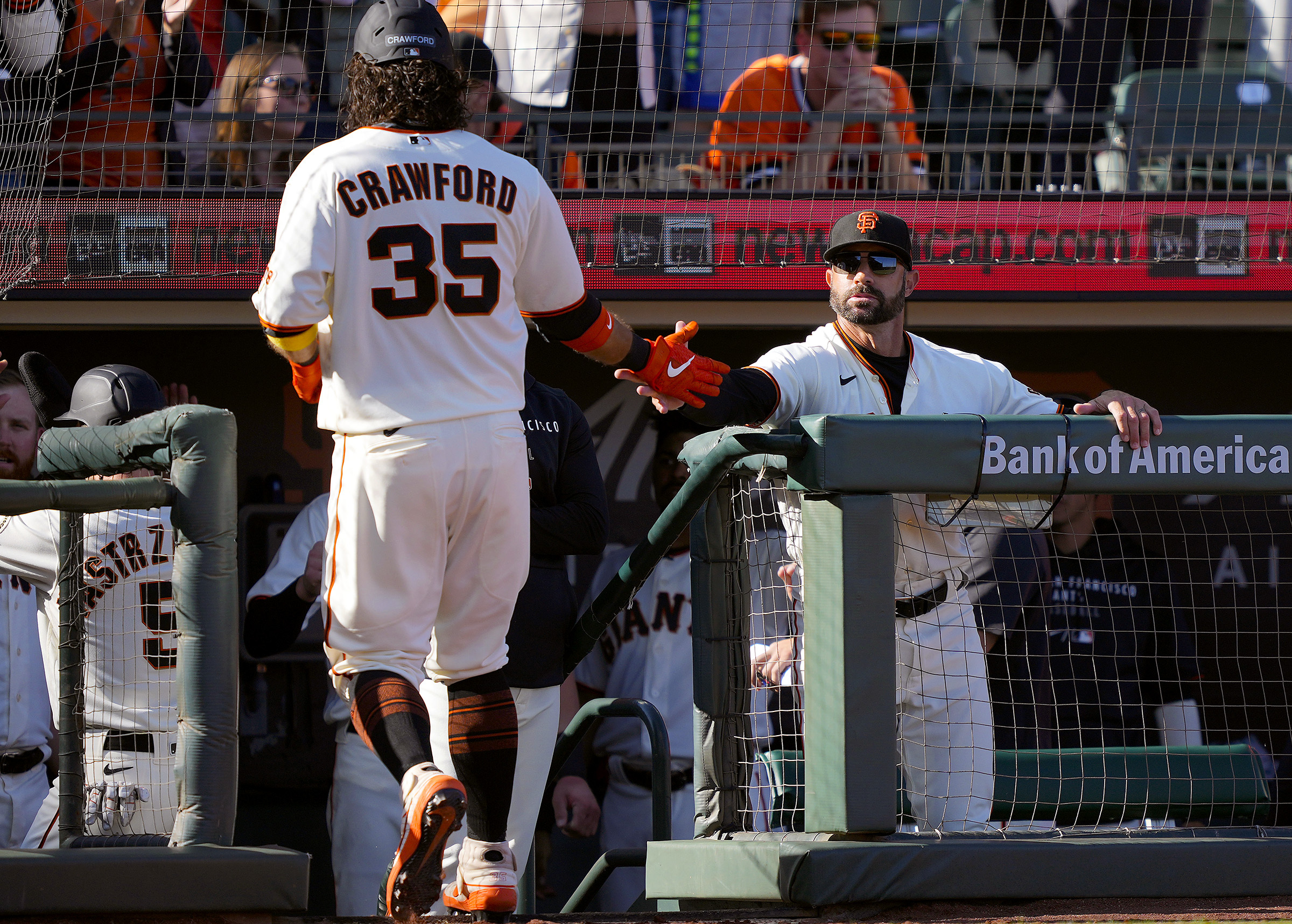
Kapler has not completely shed the stereotype. He arrives for coffee near Oracle Park in ripped jeans and a trucker hat, driving an electric scooter. He does not own a car. He can turn any brief exchange into a conversational marathon. (“I usually bail after, like, seven, eight minutes,” Longoria says, laughing.) He devotes himself completely to the pursuit of optimal performance.
“This is pretty much all I do,” he says. “My boys are grown up. [Chase is a junior at UCLA; Dane is a freshman at British Columbia.] I don't socialize all that often.”
Says Silvestri, “I think if he had it his way, his home address would be 24 Willie Mays Plaza.”
And Kapler still makes mistakes. When he was setting the NLDS roster, he called one of the players who had not made it and told him, brusquely, that he could go home.
“I just blew past a little bit of it,” he says now, reflecting on the moment. “And I could feel that on the phone. He was fine, he was a total pro about it, didn’t have any reaction, but I imagine it stung, and it would have been probably easier for him if the manager of the team said, ‘Hey, man, this is gonna be really hard for you to hear. I'm really sorry. I appreciate how much you've contributed over the last couple of years.’ And in a way that was a little bit more sensitive.”
He says he will call the player at some point to smooth things over. Still, he says, “I don't feel obligated to do that, because I do feel like I gave him the information. To some degree it's our responsibility to receive that information and [have] our feelings hurt a little bit.”
That may sound cold. It may be cold. But it is authentic. Kapler will not renounce a process he believes in just because the results have not always been good.
He reminds his players often not to get caught up in recent performance. A slump is not necessarily an indictment of your preparation. Sometimes it’s just bad luck. “Our players are not their last two weeks,” he says. “Our team is not our last two weeks.”
Kapler continues to insist that the changes he has made are marginal. He is a work in progress, he says. He is not his last two weeks, either. Still, one of the ways in which he has most changed is his belief in the value of team chemistry. People perform better when they are excited to come to work, he says. That’s small, but it matters.
“If the margins are added together,” he says, “Maybe they become a little bit less marginal.”
Maybe they do.
More MLB Coverage:
• Tigers State Their Intent With a Savvy Signing
• Rankings and Predictions for MLB's Top 50 Free Agents
• Relief Pitching Is Out of Control
• Buster Posey Never Wanted the Attention He Deserves
